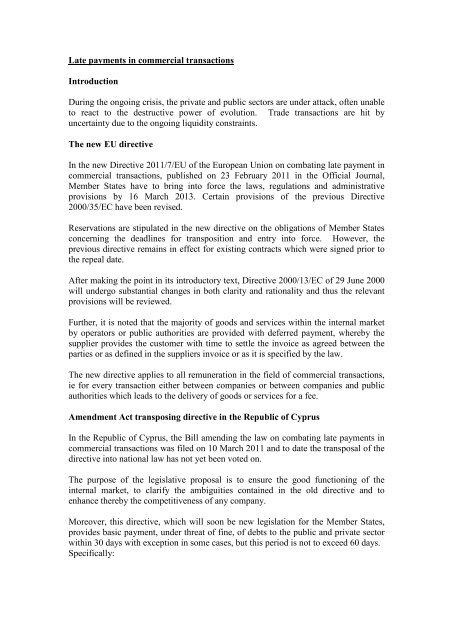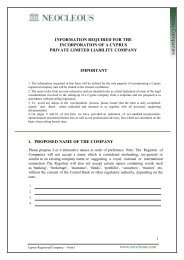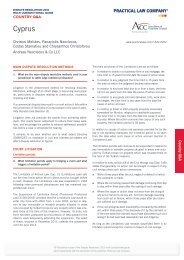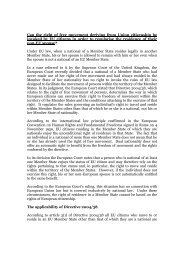Late payments in commercial transactions - Andreas Neocleous & Co
Late payments in commercial transactions - Andreas Neocleous & Co
Late payments in commercial transactions - Andreas Neocleous & Co
Create successful ePaper yourself
Turn your PDF publications into a flip-book with our unique Google optimized e-Paper software.
<strong>Late</strong> <strong>payments</strong> <strong>in</strong> <strong>commercial</strong> <strong>transactions</strong><br />
Introduction<br />
Dur<strong>in</strong>g the ongo<strong>in</strong>g crisis, the private and public sectors are under attack, often unable<br />
to react to the destructive power of evolution. Trade <strong>transactions</strong> are hit by<br />
uncerta<strong>in</strong>ty due to the ongo<strong>in</strong>g liquidity constra<strong>in</strong>ts.<br />
The new EU directive<br />
In the new Directive 2011/7/EU of the European Union on combat<strong>in</strong>g late payment <strong>in</strong><br />
<strong>commercial</strong> <strong>transactions</strong>, published on 23 February 2011 <strong>in</strong> the Official Journal,<br />
Member States have to br<strong>in</strong>g <strong>in</strong>to force the laws, regulations and adm<strong>in</strong>istrative<br />
provisions by 16 March 2013. Certa<strong>in</strong> provisions of the previous Directive<br />
2000/35/EC have been revised.<br />
Reservations are stipulated <strong>in</strong> the new directive on the obligations of Member States<br />
concern<strong>in</strong>g the deadl<strong>in</strong>es for transposition and entry <strong>in</strong>to force. However, the<br />
previous directive rema<strong>in</strong>s <strong>in</strong> effect for exist<strong>in</strong>g contracts which were signed prior to<br />
the repeal date.<br />
After mak<strong>in</strong>g the po<strong>in</strong>t <strong>in</strong> its <strong>in</strong>troductory text, Directive 2000/13/EC of 29 June 2000<br />
will undergo substantial changes <strong>in</strong> both clarity and rationality and thus the relevant<br />
provisions will be reviewed.<br />
Further, it is noted that the majority of goods and services with<strong>in</strong> the <strong>in</strong>ternal market<br />
by operators or public authorities are provided with deferred payment, whereby the<br />
supplier provides the customer with time to settle the <strong>in</strong>voice as agreed between the<br />
parties or as def<strong>in</strong>ed <strong>in</strong> the suppliers <strong>in</strong>voice or as it is specified by the law.<br />
The new directive applies to all remuneration <strong>in</strong> the field of <strong>commercial</strong> <strong>transactions</strong>,<br />
ie for every transaction either between companies or between companies and public<br />
authorities which leads to the delivery of goods or services for a fee.<br />
Amendment Act transpos<strong>in</strong>g directive <strong>in</strong> the Republic of Cyprus<br />
In the Republic of Cyprus, the Bill amend<strong>in</strong>g the law on combat<strong>in</strong>g late <strong>payments</strong> <strong>in</strong><br />
<strong>commercial</strong> <strong>transactions</strong> was filed on 10 March 2011 and to date the transposal of the<br />
directive <strong>in</strong>to national law has not yet been voted on.<br />
The purpose of the legislative proposal is to ensure the good function<strong>in</strong>g of the<br />
<strong>in</strong>ternal market, to clarify the ambiguities conta<strong>in</strong>ed <strong>in</strong> the old directive and to<br />
enhance thereby the competitiveness of any company.<br />
Moreover, this directive, which will soon be new legislation for the Member States,<br />
provides basic payment, under threat of f<strong>in</strong>e, of debts to the public and private sector<br />
with<strong>in</strong> 30 days with exception <strong>in</strong> some cases, but this period is not to exceed 60 days.<br />
Specifically:
• With regard to late payment of <strong>commercial</strong> <strong>transactions</strong> the customer must pay by<br />
the mutually agreed date or, if such date has not been agreed, with<strong>in</strong> 30 days from<br />
receipt of the <strong>in</strong>voiced goods or services.<br />
• If there is provision for a process control or acceptance, and the <strong>in</strong>voice was<br />
delivered to the customer before its completion, then the deadl<strong>in</strong>e is 30 days from<br />
the completion of this process and if the process has been completed before the<br />
delivery of the <strong>in</strong>voice then it is 30 days from the receipt of the <strong>in</strong>voice.<br />
• When the buyer of the goods or recipient of the service is the public, then the<br />
deadl<strong>in</strong>e for the payment is 60 days.<br />
• If all contractual obligations have been fulfilled to the client and the amount due<br />
has not been collected, then it is possible that <strong>in</strong>terest will be added to the arrears<br />
at the rate applied by the European Central Bank, plus seven percentage po<strong>in</strong>ts for<br />
the period of late payment.<br />
The directive applies to all <strong>payments</strong> made as remuneration by way of trade. Member<br />
States may exclude debts that are subject to <strong>in</strong>solvency proceed<strong>in</strong>gs aga<strong>in</strong>st the debtor<br />
<strong>in</strong>clud<strong>in</strong>g debt restructur<strong>in</strong>g processes.<br />
The Bill transpos<strong>in</strong>g the directive <strong>in</strong>to national law emphasises that late payment <strong>in</strong><br />
<strong>commercial</strong> <strong>transactions</strong> is still widespread <strong>in</strong> the European Union creat<strong>in</strong>g liquidity<br />
problems, add<strong>in</strong>g costs, reduc<strong>in</strong>g the opportunities for <strong>in</strong>vestment and exacerbat<strong>in</strong>g<br />
the uncerta<strong>in</strong>ty for many creditors. A direct effect of this situation is that healthy<br />
competition and solvency are often compromised.<br />
F<strong>in</strong>ally, based on the Bill, <strong>in</strong> article 7 of the basic law, a new subsection is foreseen<br />
under which the creditor also has the right to require reasonable compensation for any<br />
costs <strong>in</strong>curred <strong>in</strong> the recovery of the lump sum, due to the late payment of the debtor,<br />
<strong>in</strong>clud<strong>in</strong>g costs attributable <strong>in</strong>ter alia to the use of lawyers or debt collection agencies.<br />
Future legislative proposals <strong>in</strong> the EU<br />
Future legislative proposals <strong>in</strong> the EU <strong>in</strong>tend to improve the recovery of <strong>payments</strong><br />
across the EU and to encourage trade and services between Member States. Therefore,<br />
the European Parliament called the <strong>Co</strong>mmission to promote new laws for the freez<strong>in</strong>g<br />
and publication of debtors’ assets.<br />
Given the fact that the s<strong>in</strong>gle European market gives citizens the right to live, work<br />
and operate anywhere <strong>in</strong> the EU, it is emphasised that it is simultaneously necessary<br />
to preserve the right to justice for fraud, theft or non-payment of debts. Based on the<br />
fact that the current level of success of cross border debt recovery is extremely low,<br />
the Parliament asked the <strong>Co</strong>mmission to propose two draft regulations concern<strong>in</strong>g the<br />
electronic European order of payment for freez<strong>in</strong>g the debtor’s assets and for<br />
disclosure. Based on the above regulations, national courts will have the right to issue<br />
orders without a correspond<strong>in</strong>g orig<strong>in</strong>al notice to be notified to the debtor and limited<br />
to the m<strong>in</strong>imum of costs.<br />
The European <strong>Co</strong>mmission has already <strong>in</strong>formed the Parliament that it plans to submit<br />
the Bill concern<strong>in</strong>g the freez<strong>in</strong>g of debtors’ assets from July 2011 as well as a draft<br />
legislation on the transparency of debtors’ assets which is scheduled for 2013.
Author:<br />
Law Firm:<br />
Website:<br />
Christos Floridis<br />
<strong>Andreas</strong> <strong>Neocleous</strong> & <strong>Co</strong> LLC<br />
www.neocleous.com
















